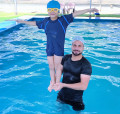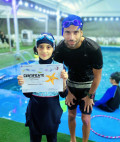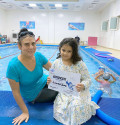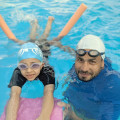
Kickboxing for Kids Learn Hook Moves, How to Learn
2023-12-01 - kick-boxingKickboxing for Kids Learn Hook Moves, How to Learn
I. Introduction
Kickboxing for kids is more than just a physical activity;
it's a holistic approach to building a child's character and well-being. In
this article, we'll delve into the world of kickboxing, specifically focusing
on the intriguing hook moves and how children can effectively learn them.
II. Benefits of Kickboxing for Kids
Physical Fitness and Coordination Kickboxing provides an
excellent avenue for kids to stay physically active, enhancing their
coordination and motor skills.
Building Confidence and Discipline The structured nature of
kickboxing instills discipline, while the gradual mastery of techniques boosts
a child's confidence.
Stress Relief for Young Minds In today's fast-paced world,
kickboxing offers a unique outlet for children to release stress and pent-up
energy.
III. Understanding Hook Moves
What Are Hook Moves in Kickboxing? Hooks are dynamic
striking techniques where a fighter aims to connect with the side of the
opponent's head using a bent arm.
Importance of Learning Hook Techniques Mastering hook moves
not only improves a child's offensive capabilities but also hones defensive
skills.
IV. How to Teach Kickboxing to Kids
Age-Appropriate Techniques Tailoring kickboxing techniques
to suit a child's age ensures effective learning without unnecessary strain.
The Role of a Qualified Instructor Enlisting the guidance of
a qualified instructor is paramount to ensure the child's safety and proper
skill development.
Safety Measures for Young Kickboxers Implementing safety
protocols, such as protective gear and supervised practice, is crucial in
creating a secure learning environment.
V. Making Learning Fun
Incorporating Games and Challenges Engaging activities make
the learning process enjoyable, fostering a positive attitude towards
kickboxing.
Creating a Positive Environment A supportive and encouraging
atmosphere is key to helping kids overcome challenges and stay motivated.
VI. Common Challenges and Solutions
Overcoming Initial Hesitation Addressing a child's initial
reservations involves patience, encouragement, and gradual exposure to the
sport.
Dealing with Frustration Kickboxing teaches resilience;
guiding kids to persevere through frustration contributes to their emotional
growth.
VII. Tips for Parents and Instructors
Encouraging Consistency Consistent practice is fundamental;
parents play a vital role in motivating their children to stay committed.
Setting Realistic Goals Establishing achievable goals
ensures a sense of accomplishment, motivating kids to progress steadily.
Providing Positive Reinforcement Regularly acknowledging a
child's efforts with positive reinforcement enhances their self-esteem.
VIII. Success Stories
Notable Cases of Kids Mastering Kickboxing Highlighting
inspiring stories of young kickboxers who have excelled in the sport motivates
others to pursue their passion.
The Impact on Overall Well-being Examining how kickboxing
positively influences a child's physical and mental well-being reinforces its
significance.
IX. Frequently Asked Questions (FAQs)
A. What age is suitable for kids to start kickboxing? It's
advisable to start kickboxing lessons around the age of 6 or 7, considering a
child's physical and emotional readiness.
B. How often should kids practice kickboxing? Regular
practice, ideally 2-3 times a week, ensures steady progress without
overwhelming young learners.
C. Are there any safety concerns parents should be aware of?
Parents should prioritize proper protective gear, supervision, and
age-appropriate techniques to mitigate potential risks.
D. Can kickboxing help with kids' focus and academic
performance? Yes, kickboxing enhances focus, discipline, and stress management,
potentially positively impacting academic performance.
E. What equipment is essential for young kickboxers? Basic
equipment includes gloves, mouthguards, and appropriate clothing; consult with
the instructor for specific requirements.
Conclusion
Kickboxing for kids extends beyond physical activity,
offering a path to holistic development. By learning hook moves and embracing
the sport's principles, children gain valuable life skills that contribute to
their overall well-being.







.jpg)











































































































































































































